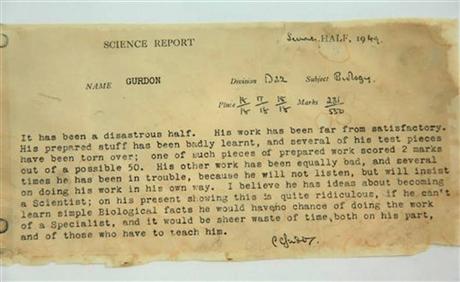Nobel prize winner got poor grades in science


In this undated photograph taken by Nobel prize winner Sir John Gurdon of his Eton College Summer 1949 report card, which describes his idea for becoming a scientist ‘ on his present showing that is quite ridiculous’ . The report card indicates that he was at that stage bottom of his class. Gurdon went on to study Zoology at Cambridge won the 2012 Nobel Prize for Medicine which he shared with Japanese scientist Shinya Yamanaka, that was announced in Stockholm, Monday Oct. 8, 2012 .(AP Photo/John Gurdon)
LONDON (Agencies) — Teacher knows best?
That doesn’t appear to be the case for one teacher who called a future Nobel Prize winner’s dreams of becoming a scientist “quite ridiculous” in a scathing report card.
John Gurdon’s future success was almost nipped in the bud in 1949 when a schoolmaster at elite Eton College wrote on his report card that pursuing science would be a waste of time.
“His work has been far from satisfactory,” the teacher wrote. “If he can’t learn simple biological facts he would have no chance of doing the work of a specialist, and it would be sheer waste of time, both on his part, and of those who have to teach him.”
The teacher said that the teenaged Gurdon had gotten into trouble several times and didn’t listen.
The scientific community could argue it’s a good thing he didn’t.
After starting out studying classics at Oxford, Gurdon switched to zoology. In 1962, he showed that the DNA from specialized cells of frogs, like skin or intestinal cells, could be used to generate new tadpoles — a breakthrough rewarded Monday with the Nobel Prize for Medicine, which he shared with Japan’s Shinya Yamanaka.
Scientists are trying to build on the work of Gurdon and Yamanaka to create replacement tissues for treating diseases like Parkinson’s and diabetes.














